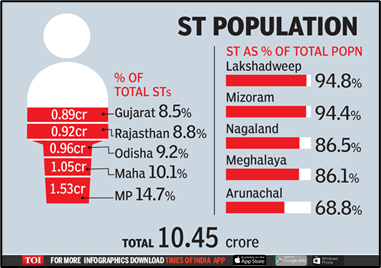In News:
- President Droupadi Murmu addressed a National Workshop on ‘Janjatiya Anusandhan – Asmita, Astitva evam Vikas’, held at the Rashtrapati Bhavan.
What’s in today’s article:
- Scheduled Tribes in India (Statistics, Criteria, Constitutional provisions, Programmes, etc.)
- News Summary (President’s Address)
Scheduled Tribes in India:

- According to the 2011 Census, the Scheduled Tribes account for 104 million representing 8.6% of the country’s population.
- These Scheduled Tribes are spread throughout the country largely in forest and hilly regions.
- The essential characteristics of these communities are:
- Primitive Traits; Geographical isolation; Distinct culture; Shy of contact with community at large; Economically backwards.
- Government of India set up Ministry of Tribal Affairs in 1999 after the bifurcation of Ministry of Social Justice and Empowerment.
- As in the case of the Scheduled Castes, the Plan objective of empowering the tribals is being achieved through a three-pronged strategy of:
- Social empowerment,
- Economic empowerment &
- Social justice
What are the constitutional provisions for tribals in the country?
- Basic safeguards provided in the Constitution:
- Educational & Cultural safeguards:
- Art. 15(4): Special provisions for advancement of other backward classes (it includes STs);
- Art. 29: Protection of Interests of Minorities (it includes STs);
- Art. 46: The State shall promote, with special care, the educational and economic interests of the weaker sections of the people, and in particular, of the Scheduled Castes, and the Scheduled Tribes, and shall protect them from social injustice and all forms of exploitation;
- Art. 350: Right to conserve distinct Language, Script or Culture;
- Art. 350: Instruction in Mother Tongue.
- Social safeguards:
- Art. 23: Prohibition of traffic in human beings and beggar and other similar form of forced labour;
- Art. 24: Forbidding Child Labour.
- Economic safeguards:
- Art.244: Provisions of Fifth Schedule shall apply to the administration & control of the Scheduled Areas and Scheduled Tribes in any State other than the states of Assam, Meghalaya, Mizoram and Tripura which are covered under Sixth Schedule;
- Art. 275: Grants in-Aid to specified States (STs&SAs) covered under Fifth and Sixth Schedules of the Constitution.
- Political safeguards:
- Art. 330: Reservation of seats for STs in Lok Sabha;
- Art. 337: Reservation of seats for STs in State Legislatures;
- Art. 334: 10 years period for reservation (Amended several times to extend the period.);
- Art. 243: Reservation of seats in Panchayats;
- Art. 371: Special provisions in respect of NE States and Sikkim.
Article 342 of the Constitution:
- Under Article 342(1), the President may with respect to any State/Union territory, and where it is a State, after consultation with the Governor thereof, specify the tribes or tribal communities or parts of or groups within tribes or tribal communities.
- The list of Scheduled Tribes is State/UT specific and a community declared as a Scheduled Tribe in a State need not be so in another State.
- Under Article 342(2), Parliament may by law include in or exclude from the list of Scheduled Tribes specified in a notification issued under clause (1) any tribe or tribal community or part of or group within any tribe or tribal community.
Special Programmes & Enactments:
- Successive Union governments have enacted progressive legislation, programmes and schemes for development and empowerment of Scheduled Tribes and other traditional Forest Dwellers (Recognition of Forest Rights Act, 2016).
- The provisions of Panchayats (Extension to the Scheduled Areas) Act, 1996, Minor Forest Produce Act, 2005 and the Tribal Sub-Plan strategy are focused on the socio-economic empowerment of Scheduled Tribes.
News Summary:
- Addressing the gathering, the President said that blending of technology and traditions, modernity and culture is the need of the hour. We must be ready to lead the world with the power of knowledge.
- The promotion and development of knowledge of tribal society would play an important role in making India a knowledge superpower.
- She expressed confidence that the people of the tribal society, writers, researchers, would make an invaluable contribution to the development of the tribal society with their thoughts, works and research.
- Pointing to the fact that the population of Scheduled Tribes in our country is more than 10 crore, the President said that to ensure the benefits of development reach to all of them and at the same time, their cultural identity remains intact, is the challenge before us.









